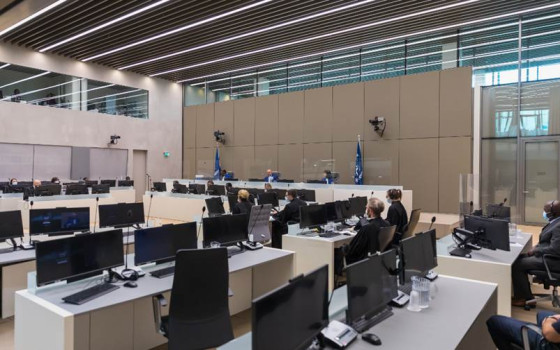
Sanctions against the International Criminal Court threaten the global fight against impunity and undermine the credibility of international law..

- Europe and Arabs
- Wednesday , 12 November 2025 8:37 AM GMT
New York – The Hague: Europe and the Arabs
The President of the UN General Assembly warned that intimidation and sanctions against the International Criminal Court (ICC) constitute "attacks on the very principles of international law." Annalena Baerbock made these remarks during the Assembly's discussion of the ICC's annual report on Tuesday, in light of the sanctions imposed by the United States on judges and prosecutors this year.
The sanctions stem from an executive order issued in February in response to the UN-backed court's issuance of arrest warrants for Israel's then-Prime Minister and Defense Minister on charges of "crimes against humanity and war crimes."
Sanctions against the ICC can include freezing property or assets in the United States, as well as travel bans. Baerbock noted that the court was founded on the principle that "justice is a universal duty," but its mission is not yet complete.
"For more than two decades, the Court has confronted impunity and demonstrated that even in the darkest moments, accountability remains possible," the General Assembly President said. She added: “But today, as we witness atrocities that continue to shock the conscience of humanity, it is clear that the Court’s mission is far from complete.”
Deliberate Attacks on the Court
The President of the General Assembly highlighted the importance of international cooperation in investigations, arrests, and the execution of arrest warrants, as well as the necessity of independence to ensure the prosecution of crimes under the Rome Statute, the international treaty that established the Court.
However, she cautioned that the Court has not been immune to interference, adding: “Court officials have been sanctioned for upholding the rule of law and pursuing accountability; its systems have faced cyberattacks aimed at undermining its credibility.”
Baerbock said: “These are not isolated incidents; they are deliberate attacks on the Court aimed at weakening the rule of law and undermining confidence in international institutions.”
Ending Intimidation
During yesterday’s meeting, a resolution was adopted emphasizing the need to enable Court officials to carry out their mandate “without intimidation” and “condemning any threats, attacks, or interference against the Court, its staff, or its collaborators.” The President of the Court, Judge Tomoko Akane, told the General Assembly that the Court’s rulings remind the international community that justice “transcends borders and interests,” but when “judges are pressured, threatened, or undermined, the credibility of international law itself is weakened.”
She added: “Attacks, threats, and coercive measures against the Court and its officials have continued and remain a serious threat to the administration of justice by the Court and to the global fight against impunity.”
Achievements and Challenges
The President highlighted the Court’s achievements and challenges, and called on member states to defend the international legal order. She mentioned some of the key cases before the Court, including those of individuals accused of serious crimes in Sudan, Afghanistan, and Israel, but noted that arrest warrants can only be executed with the cooperation of states.
As of August of this year, more than 18,000 victims had participated in cases before the International Criminal Court. Akane said, “The court gives victims a voice, a space to tell their stories, and hope for truth and accountability,” before emphasizing that reparations are an integral part of the proceedings.
She pointed to the Victims Trust Fund established by the ICC, which has achieved tangible results—in Uganda, for example—where nearly 50,000 victims have received financial compensation for war crimes committed against them.












No Comments Found